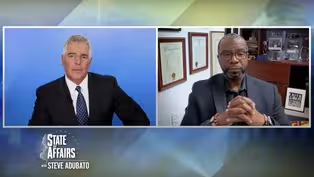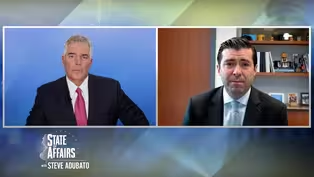State of Affairs with Steve Adubato
Public Frustration and the Ongoing Nursing Shortage
Clip: Season 7 Episode 29 | 7m 36sVideo has Closed Captions
Public Frustration and the Ongoing Nursing Shortage
Cathy Bennett, President and CEO of the New Jersey Hospital Association, joins Steve Adubato to address the ongoing nursing shortage, public frustration, and the innovative technology that came about because of COVID-19.
Problems playing video? | Closed Captioning Feedback
Problems playing video? | Closed Captioning Feedback
State of Affairs with Steve Adubato is a local public television program presented by NJ PBS
State of Affairs with Steve Adubato
Public Frustration and the Ongoing Nursing Shortage
Clip: Season 7 Episode 29 | 7m 36sVideo has Closed Captions
Cathy Bennett, President and CEO of the New Jersey Hospital Association, joins Steve Adubato to address the ongoing nursing shortage, public frustration, and the innovative technology that came about because of COVID-19.
Problems playing video? | Closed Captioning Feedback
How to Watch State of Affairs with Steve Adubato
State of Affairs with Steve Adubato is available to stream on pbs.org and the free PBS App, available on iPhone, Apple TV, Android TV, Android smartphones, Amazon Fire TV, Amazon Fire Tablet, Roku, Samsung Smart TV, and Vizio.
Providing Support for PBS.org
Learn Moreabout PBS online sponsorship[INSPRATIONAL MUSIC STING] - Back by popular demand.
Cathy Bennett, President and CEO of New Jersey Hospital Association.
Good to see you, Cathy.
- Good to see you again, Steve.
- Been too long, we'll have you on again real soon, but I, right now I wanna talk about, as we do this program in the middle of November 2023, be seen later, the nursing crisis in our state and nation.
How bad is it and what's the impact on hospitals?
- The nursing shortage, as you know, it's a challenge, and it's one that's impacting healthcare systems and facilities across the country.
We're all facing it, and it's especially prevalent in New Jersey right now as we're predicted to have a shortfall of 11,000 nurses by 2030.
That's the third-largest shortfall in the nation.
- You know, we've talked to a lot of Higher Ed leaders and Higher Ed's changing on so many levels out of necessity, right, the need is there.
What's the role of higher education as it relates to this nursing crisis?
- The role is critical, as you know, we need to make sure that we have an education system, you know, that has the resources they need to stand up.
You know, the courses that students want to enroll here in New Jersey, we have a lot of people that apply to Nursing School.
And the Nursing Schools here, simply can't accept them 'cause they don't have enough educators.
- Let me try this, there's a lot of debate and confusion around nursing ratios, nursing and patient ratios.
The economics of hospitals are what they are and we're underwritten by a variety of different hospitals, all not-for-profit because hospitals are not-for-profit in the state.
Is there any standard as to what that should be, the patient to nurse ratio?
- So our hospitals, Steve, use established metrics and professional judgment to provide safe staffing for patients.
You know, rigid ratios themselves, they impede best practices in care delivery.
They discourage innovation and they dilute the real-time clinical judgment and flexibility that our care teams need.
- You know, I just mentioned the economics, if you will, of hospitals, and we've had this discussion in the past, but I want to revisit it.
To what degree, from your perspective, and the Hospital Association represents a large percentage of the hospitals in the State of New Jersey, correct?
- We represent all of the acute care hospitals, correct.
- All of them.
- Yes.
- Do we have, quote, "Too many hospitals" in New Jersey?
- We do not have too many hospitals in New Jersey.
Steve, you know, the hospitals we have are integral parts of their communities.
They're the anchors providing jobs, providing resources, providing, you know, community health benefits.
And as we saw through COVID, and as we've seen as we've come out of COVID, our hospitals are the place that all of our community members can go to, regardless of ability to pay 24/7 and get treatment and ongoing care.
- Cathy, from your perspective, you mentioned the pandemic.
How do you believe COVID has changed hospitals and delivery of healthcare in hospitals forever because of COVID?
- I believe, some of the things we've seen are that innovations like Telehealth, and remote patient monitoring have allowed hospitals, and allowed their team members to do jobs from beyond the four walls of the hospital.
And that's something that has allowed us to really meet patients where they're at and where, you know, they can have care in the most accessible way.
- You know, as COVID was at its peak 2020, moving into 2021, you remember as I do, and you're much closer to it than I am, Cathy.
The celebrations, the honoring, the recognizing of those on the front lines are healthcare leaders, physician, nurses, respiratory therapists, those who held the hands of patients as they tried to talk to their family members via FaceTime and many of them passed tragically.
Fast-forward, a whole range of hospital professionals, people who work in hospitals are concerned.
Not only that public sentiment has shifted, but they are now targets of certain people who see them as some sort of enemy in this public health debate around all kinds of confusion, excuse me, all kinds of issues.
How the heck did hospital professionals get on the wrong end of this?
- I think what we saw emerge, you know, even during the pandemic as we were coming to the tail end, was a lot of frustration from the public that wanted to be, you know, back out in public, did not want a mask and, you know, wanted to interact.
They wanted their kids back in schools.
And because hospitals were so key, hospitals were doing all the testing, that's where you went to for treatment.
Hospitals were setting up the vaccination sites in the communities, you know, the issues that people felt about COVID, they started to conflate with hospitals.
- So hospital professionals are trying to provide community health services to people in the community and they're on the wrong end of frustration.
- I think that that's really what we're saying.
Wrong end of frustration.
You know, that's just bubbled over.
And what we've seen is, you know, a public that wants things to be back to normal.
And so, you know, part of this is that, you know, the hospitals were conflated with this thing that didn't feel normal.
And when we look back over what this three years looked like, let's be honest, it, you know, was dealt with uncertainty, inability, you know, inability to get testing out because of where we were nationally.
And then, you know, we turned the corner and there was still masking going on, you know, and people wanted to go back out and they wanted to have a good time.
And they were hearing, you know, that part of the reason is we weren't quite over it.
Now, you know, what hospitals are at, where, you know, the public is at now.
We are in an endemic state.
We deal with, you know, surges as they come up.
But, you know, we make sure the public, you know, is safe.
But, again, we're back to our business of quality, equitable care for all.
- Cathy Bennett, President and CEO of New Jersey Hospital Association.
Thank you, Cathy, we appreciate it.
- Thanks so much, Steve.
- You got it, I'm Steve Adubato, make sure you join us next time.
See you then.
- [Narrator] State of Affairs with Steve Adubato is a production of the Caucus Educational Corporation.
Celebrating 30 years in public broadcasting.
Funding has been provided by New Jersey Institute of Technology.
PSEG Foundation.
Community FoodBank of New Jersey.
New Jersey’s Clean Energy program.
New Brunswick Development Corporation.
PNC Foundation.
Robert Wood Johnson Foundation.
The Fidelco Group.
And by The Adler Aphasia Center.
Promotional support provided by Meadowlands Chamber.
And by NJBIZ.
At the Community Food Bank of New Jersey, we are working now more than ever to fill the emptiness caused by hunger.
We are the state's largest anti-hunger organization.
And together with our 800 plus community partners, we are committed to delivering food, help, and hope, to our hundreds and thousands of neighbors in need.
New Jersey's Dark History of Redlining and Segregation
Video has Closed Captions
Clip: S7 Ep29 | 11m 14s | New Jersey's Dark History of Redlining and Segregation (11m 14s)
NJEDA CEO Talks About NJ's Cultural Ties to East Asia
Video has Closed Captions
Clip: S7 Ep29 | 9m 56s | NJEDA CEO Talks About NJ's Cultural Ties to East Asia (9m 56s)
Providing Support for PBS.org
Learn Moreabout PBS online sponsorship
- News and Public Affairs

Top journalists deliver compelling original analysis of the hour's headlines.

- News and Public Affairs

FRONTLINE is investigative journalism that questions, explains and changes our world.












Support for PBS provided by:
State of Affairs with Steve Adubato is a local public television program presented by NJ PBS

